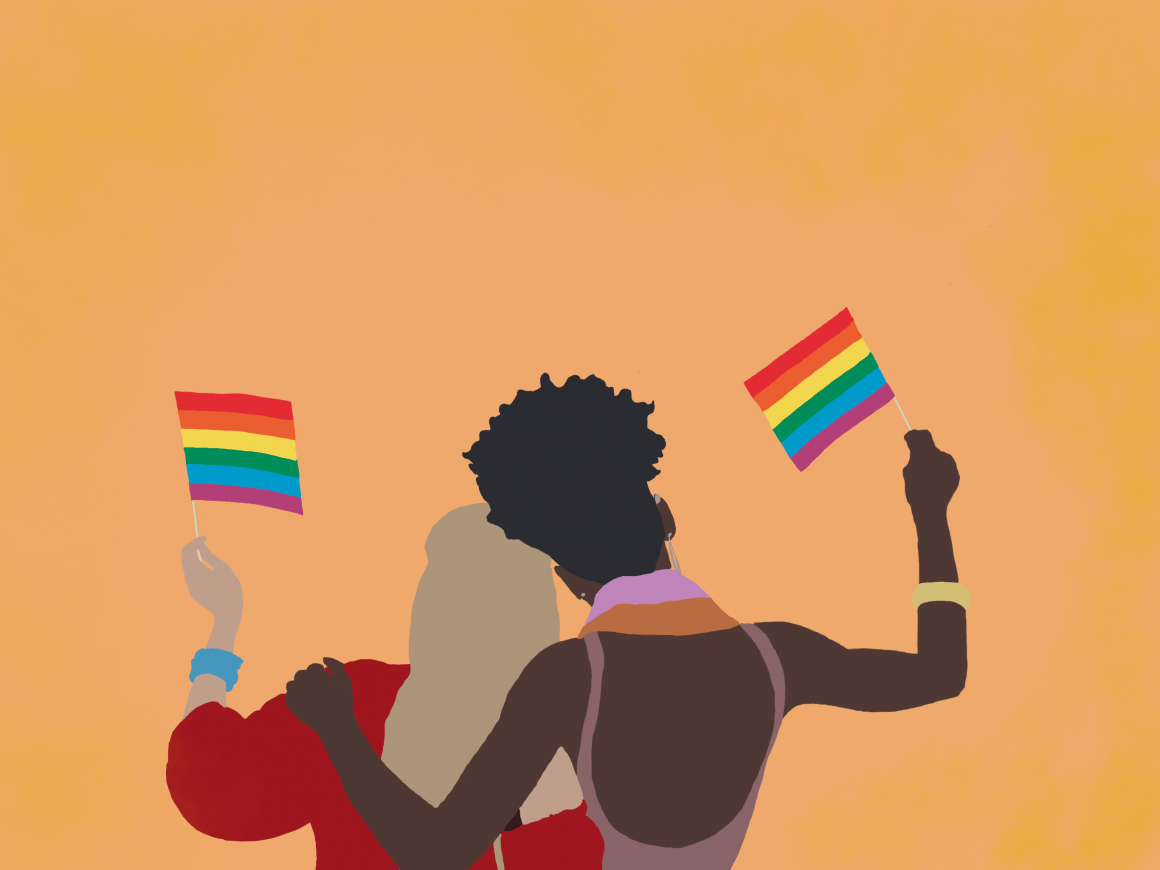
Calgary Pride Week 2021: Recap
By Rachneet Randhawa, September 28 2021—
Calgary Pride Week 2021 made a colourful return with B!G Pride 2021. A mix of online and in-person events, B!G Pride 2021 offered an incredible lineup of exciting programs and events while adhering to health and safety protocols.
The Calgary Pride Parade and Festival was presented by TD and was a free event spanning the 10 days leading up to Labour Gay long weekend. Thousands gathered in celebration of gender and sexual diversity.
“We don’t pivot, We SASHAY” was the tagline of the celebration and this year’s pride had everything from thematic films to live theatre and music to circus arts activities with community partners — even including an outdoor drag show at this year’s annual VegFest 2021.
This year’s annual Pride Parade Day on Sept. 5 was virtual and before the finale of B!G Pride, there were a suite of events throughout the past week. One of the inaugural events was the Real Life Rainbow Royalty live-streamed on Aug. 31. It featured India’s — and indeed the world’s — first-ever gay Prince, Manvendra Singh Gohil, Prince of Rajpipla.
Prince Mavendra shared his lived experiences of complex and conflicting identities with Calgary Pride. He has been featured on the Oprah Winfrey Show three times and appeared twice on Keeping up with the Kardashians. He is also well-known for his advocacy and social justice efforts in supporting the 2LGBTQIA+ worldwide community, even co-founding an organization called Lakshya Trust, the first of its kind for 2LGBTQIA+ empowerment.
Prince Manvendra’s impressive resume continues. He is also an ambassador consultant for the AIDS Healthcare Foundation, the largest and oldest nonprofit for HIV testing and treatment. The Gauntlet attended the virtual event, hosted by Calgary Pride’s Director of Organizational Change, Hasina Juma, to learn more.
The themes of the virtual live stream focused on four key areas:
- Prince Manvendra’s internal and external conflict of individual and cultural identities and belief systems
- Intersectional and overlapping identities including race, ethnicity, sex and gender and mental health with a focus on the South Asian diaspora
- Community dialogue
- And lastly sharing a parents’ perspective on embracing their child’s journey of embracing their sexual orientation
As Prince Manvendra mentioned, despite increasing acceptance of people in the 2LGBTQIA+ community, there is always going to be controversy and stigma around being gay.
When Prince Manvendra decided to come out, he faced an incredible amount of backlash and rejection from even his own family and parents who threatened at one point to federally sanction him and take away his royal privileges and titles as a punishment for revealing his true self.
There are many cultural and fallacious norms in India that if a son comes from an upper socio-economic class he cannot be 2LGBTQIA+ identifying. Years ago, he even ended up having an arranged marriage to a woman which lasted barely a year due to not having disclosed his gender and sexual orientation when he was forced to tie the knot. Eventually, his entire family came around but were it not for his resilience in wanting to be a changemaker for challenging the status quo, nothing would have transformed.
Although India legalized gay marriage in 2018 through the Indian Supreme Court, there is still a lack of public education and ignorance on the subject, so homophobia continues to persist. Prince Manvendra mentioned the influences of colonialism that made the gender binary commonplace, something that had not always been the case in India. In fact, South Asian scriptures tell of the origins of the third gender — or Hijra community — with the powers to bless in many Indian folklore traditions.
Socio-cultural norms like pressures to get married and lack of awareness — let alone acknowledgement — of mental health still run rampant not only in India but in South Asian and immigrant communities around the world. For this, Prince Manvendra recommended allyship and becoming an ally for others and the “affirmative statement” which helps people of colour feel safe and understood in their respective communities.
For both movements of 2LGBTQIA+ and BIPOC to emerge alongside one another, there need to be more role models to change others’ mindsets including more open conversations in ethnic communities. One of his initiativetes, the nonprofit Lakshya Trust, is the first openly accepting transgender shelter in India which aims to bring skills, job opportunities and empowerment to an otherwise underrepresented community.
The second half of the programming was an interview with Suresh and Lavina Kapai from Bravo’s hit television series Family Karma and they shared their experiences and unconditional love of their 2LGBTQIA+ son, Amrit, and the path to acceptance as parents.
During the live Q & A session, one of the questions we asked was what can students and youth do to raise awareness for gender and sexual diversity and get more involved in the 2LGBTQIA+ community? Prince Manvendra recommended utilizing the ever so many virtual and social media platforms to foster and create momentum and also not being afraid to have that open and honest dialogue in your local community.
B!G Pride ended Pride Week 2021 with a virtual parade. But the celebration of gender and sexual diversity doesn’t end here — every day can be Pride when you choose to be open to learning more and exploring the possibilities. For those interested in learning more about the resources from the University of Calgary campus community be sure to check out the Q Centre — a safe, comfortable and inviting space for the 2LGBTQIA+ campus community which has programming on everything from Queer Mentorship to a Q Centre Pride Scholarship.
